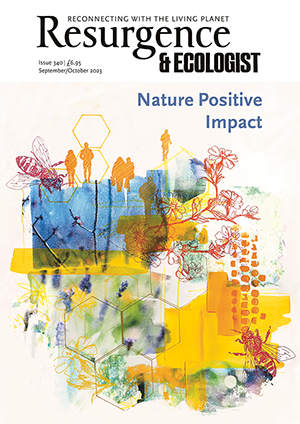This is more than a book review! It is a tribute to three heroes of mine who have become the pioneers of a new movement to bring respect for wilderness back into our lives and are the authors of two inspiring new books. But these are not just theoretical or academic or speculative books. They offer inspiring experiences of practical work to heal Nature, and living examples to show how to restore degraded land and devastated forests.
The leaders of industrial agriculture and factory farming see soil simply as a resource for financial gain. But a large portion of industrial farming is failing even at this goal. Much of modern agriculture is so capital intensive that it requires huge investments in machinery and equipment as well as chemical fertilisers, infrastructure, transportation and other technology. Much agriculture in Europe is heavily dependent on state subsidies, in spite of which farmers are struggling to survive. It is hard to make farming pay, particularly if a farm is in a part of the country where the soil is unsuitable for growing grain or producing meat and milk.
Knepp Estate was one such farm that was making financial losses, even after state subsidies. Fortunately, the owners, Isabella Tree and Charlie Burrell, had an epiphany. They found that working in harmony with Nature and giving up their loss-making arable production was the most sensible approach to follow. The result has been a massive increase in biodiversity and the return of species previously lost to the area.
My wife June and I had the pleasure of visiting Knepp Estate, and while we were there I wondered if I was in England, or in the African bush! I told the owners: “You are the bushman and bushwoman of England!”
Knepp Estate is one of the most significant hotspots for wildlife in Britain. At midnight, in the dark, we were taken outside to listen to the love song of nightingales. It was one of the rarest and most memorable experiences of my life.
Knepp Estate is a great success story. Thousands of vis-itors are now making their way to see and enjoy one of the most beautiful wild landscapes in Britain. And the couple’s email inbox is full of questions from people who want to know how to go about rewilding their own land. The Book of Wilding is the answer. The authors explain everything, in a most readable way. What is rewilding? How can we heal the land and the water? How can we create dynamic habitats with vegetation? What can we learn from Nature? How can rewilding be economically viable? What is the right relationship between people and plants? How can we apply rewilding in a small space? Other similar questions are raised and resolved in this remarkable book, which is a magnificent manifesto as well as an encyclopaedia of wilding. It is a practical, informative and inspiring guide, written simply, clearly and comprehensively, that shows how to begin to bring wilderness back into our fields, farms and gardens and even into our towns and cities. Anyone with some land would benefit greatly from reading this book. As Joanna Lumley says, it is “a handbook of hope”.
The authors argue that we should balance Nature-friendly farming with well-considered wilding. They make a powerful case, and we must acknowledge their profound insights. If we wish to protect the wellbeing of people and the wellbeing of our precious planet Earth, we need to balance the needs of human beings and also the needs of more-than-human beings. Rewilding is a prerequisite for maintaining biodiversity and the integrity of Nature.
Ben Goldsmith’s God is an Octopus is an intimate book. When Goldsmith lost his beloved 15-year-old daughter in an accident, he did not know how to cope with this terrible tragedy and his deep grief. Filled with sadness, pain and sorrow, he tried everything from seeing a medium to spiritual healing, from God to ayahuasca. He searched for answers here, there and everywhere. In the end he found solace and peace in Nature in general, and in wilding in particular.
For him a connection with Nature was not new. From his early childhood he had been a keen observer and lover of Nature. His uncle, Edward Goldsmith, founded The Ecologist magazine and was an influential campaigner for Nature conservation. But in his dark and desperate state of grieving, Ben Goldsmith found new meaning and profound healing in the natural world. God, spirituality and inner peace came to him in an unconditional love for Nature. This love was as romantic as it was rational. He devoted himself simply to loving and restoring Nature, not only through bringing wilderness into his own 500-acre farm in Somerset, but also through helping other farmers and landowners to do the same.
I had the wonderful opportunity to invite Goldsmith to Schumacher College to launch his book. He is a passionate and well-informed speaker, and is totally devoted to seeing at least 30% of land in the UK being returned to the wild, as promised by the government in order to avert climate catastrophe. He is committed to making sure that these promises and plans are fulfilled. Read his book, and you’ll find out how you too can help to realise this pledge.
The authors of both The Book of Wilding and God is an Octopus are very clear in their conviction that there is no contradiction between meeting our need for food and embracing wilding. Regenerative agriculture and wilding complement each other. We need both good farming and good wilding. And these two books have one simple message at their heart, which is to “put Nature back in the driving seat”.
The Book of Wilding: A Practical Guide to Rewilding Big and Small by Isabella Tree & Charlie Burrell. Bloomsbury, 2023. ISBN: 9781526659293.
God is an Octopus: Loss, Love and a Calling to Nature by Ben Goldsmith. Bloomsbury, 2023. ISBN: 9781399408356.







